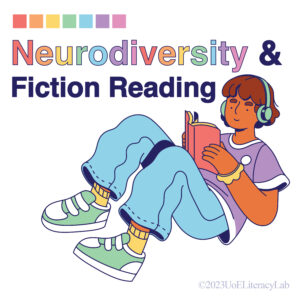Neurodiversity and Narrative Fiction
 2022-2023
2022-2023
Stories often reflect the social world we live in, and can enrich our understanding of ourselves and others. Adolescence is a period of life characterised by exploration of identity and discovery of self; books offer opportunities for young people to explore personally meaningful content.
Research focusing on inclusive representation in young people’s literature has focused almost entirely on racial and ethnic representation. This study will be the first to provide detailed insight into neurodivergent young people’s perceptions of how their lives and experiences are represented in narrative fiction (and other text types), with neurodivergent young people informing our research process.
Project Aims:
To understand the scale and breadth of representation of neurodivergent young people in fictional texts for secondary school readers.
To understand neurodivergent young people’s opinions and experiences of representation of neurodivergence in narrative fiction.
Project Outcomes:
Database of YA books featuring neurodivergent characters
Findings from interviews with neurodivergent young people
The project captured neurodivergent young people’s perspectives on how they think neurodivergence should be represented in YA fiction. For example, that fictional neurodivergent characters should be complex, realistic, and positive, and that the representation of neurodivergence should be normalised in books and other forms of media.
You can access the published research paper here: https://onlinelibrary.wiley.com/doi/10.1111/lit.12369
The project also captured neurodivergent young people’s perspectives on the benefits and potential harms of neurodivergent representation in YA fiction. Benefits included supporting self-understanding and acceptance; facilitating positive emotional experiences; and reducing stigma and increasing peer understanding of neurodivergence. Potential harms included reinforcing negative stereotypes and changes in peers’ behaviour.
You can access the published research paper here: https://journals.sagepub.com/doi/10.1177/27546330241237881
Summaries
- Access a summary of the project findings here: NDNF summary
- Read about why schools need books featuring neurodivergent characters in this BookTrust blog post.
- Read advice from neurodivergent young people for writers of neurodivergent characters.
- Read about what types of neurodivergent character are being represented in YA fiction.
This project is funded by a University of Edinburgh Challenge Investment Fund. To learn more about the project you can contact Prof. Sarah McGeown: s.mcgeown@ed.ac.uk
Project Team:
Project Lead: Professor Sarah McGeown
Project Researchers: Elena Santi and Charlotte Webber
Co-investigators: Dr Katie Cebula, Dr Catherine Crompton and Professor Sue Fletcher-Watson
Project Partners:
Christina Clark, National Literacy Trust
Ruthann Hughes, BookTrust
Katie Juckes, Teacher
Lucy Juckes, Barrington Stoke
Eadaoin Lynch, Scottish Book Trust
Emily Weston, Teacher
Victoria Williamson, Author
This project was preregistered – information can be found here:
Neurodiversity and Narrative Fiction
Qualitative Study: https://osf.io/b4cfh
Aim:
1) To understand neurodivergent young people’s opinions and experiences of representation of neurodivergence in narrative fiction.


Comments are closed
Comments to this thread have been closed by the post author or by an administrator.